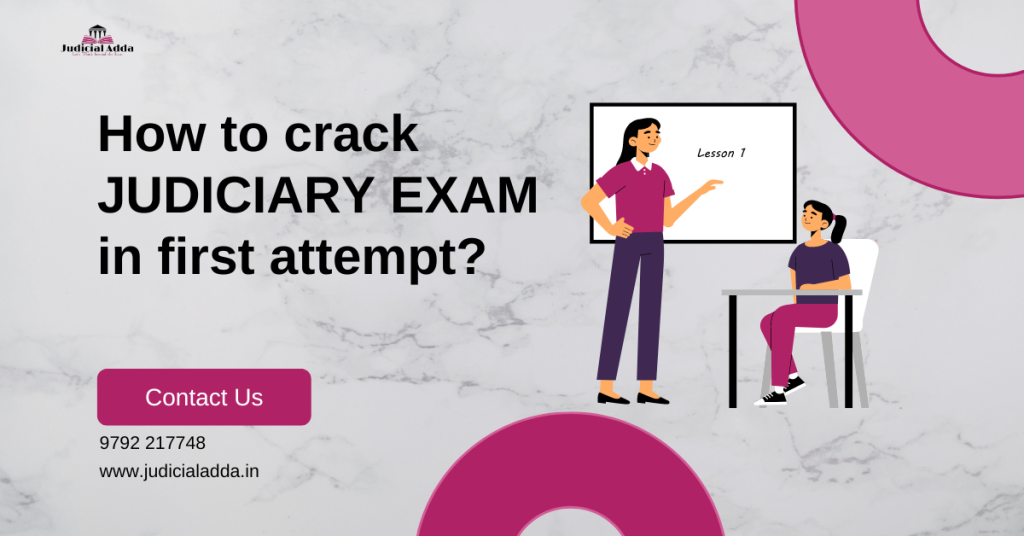
How to Crack Judiciary Exam in First Attempt?
Many Judiciary Aspirants want to know how to crack judiciary exam in first attempt. Are you pursuing LLB? If the answer is “Yes”, or have completed LLB course, then you are having most prestigious career ahead. Well! After graduation in law, various career opportunities are waiting for you. However, to be a Civil Judge is one of the most satisfactory moments for a law graduate.
That is to say, becoming a judge is a reputed career choice for a law graduate. Consequently, it requires dedication, hard work, and a strategic approach. Cracking the judiciary exam on the first attempt might seem daunting, however with the right preparation strategy and approach, it is entirely achievable. Here’s a comprehensive guide to help you ace the judiciary exam in your first go.
Understanding the Judiciary Exam Pattern
Before diving into the preparation tips, it’s essential to understand the structure and syllabus of the judiciary exam. Typically, the PCS Judiciary exam for any state comprises three stages:
- Preliminary Exam: This is an objective test to filter candidates for the mains examination.
- Mains Exam: This is a subjective test that evaluates a candidate’s knowledge of law and application.
- Interview/Viva-Voce: This stage assesses the candidate’s personality, practical knowledge, and suitability for a judicial role.
Step-by-Step Guide to Crack the Judiciary Exam
Know the Syllabus and Exam Pattern
The first step in your preparation journey is to thoroughly understand the syllabus and exam pattern of the judiciary exam for your specific state. Each state may have slight variations in their syllabus. Download the official syllabus and highlight key topics.
![]()
Create a Study Plan
A well-structured study plan is crucial. Allocate specific time slots for each subject and stick to your schedule. Ensure that your study plan includes:
- Daily study hours with short breaks
- Time for revision and mock tests
- Weekly and monthly targets
Gather the Right Study Materials
Most importantly, to qualify the Judiciary Exam, only having classes are not going to achieve the goal. The aspirants must go through the comprehensive study materials along with self-made hand notes. We advise to refer only one book for one subject. Sometimes, reading more than one book for a single subject creates ambiguity and exhausts much time unnecessarily. Therefore, invest in quality study materials, including:
- Standard textbooks for each subject
- Bare acts and commentaries
- Previous years’ question papers
- Online resources and video lectures
Focus on Conceptual Clarity
Many times, it has been observed that the aspirants qualify the Civil Judge Prelims Exam in first attempt. However, they could not get success in the Judiciary Mains Written Exam. Likewise, if they qualify the Judiciary Mains Written Exam, they could not success in interview. In short, we may say that somewhere they are lacking in conceptual clarity over the various subjects due to short cut approach. Understanding the concepts thoroughly is more important than rote learning. Focus on:-
- The Indian Constitution
- Indian Penal Code (IPC) now Bhartiya Nyaya Sanhita, 2023
- Civil Procedure Code (CPC)
- Criminal Procedure Code (CrPC) now Bharatiya Nagarik Suraksha Sanhita, 2023
- Indian Evidence Act now Bharatiya Sakshya Adhiniyam, 2023
- Transfer of Property Act
- Practice Answer Writing of above major subjects
Regular Revision
Generally, the aspirants finish their respective syllabus timely. However, they do not give enough time in revision the same. Regular revision is key to retaining what you’ve learned. Make concise notes while studying and revise them periodically. In short, we may say that what you study in the week, try to sum up and revise on each Sunday. It is not necessary to revise the full content. It would be enough if you revise the index part of the bare act of respective subject. Use flashcards and mind maps for quick reviews.
Practice Previous Years’ Papers
Solving PCS J Exams previous years’ question papers helps you understand the exam pattern, difficulty level, and frequently asked questions. It also improves your time management skills.
Judiciary Mock Tests
Judiciary Mock tests are crucial for self-assessment. They help you identify your strengths and weaknesses. Join a good test series and take these tests under exam-like conditions.
Improve Writing Skills
For the Judiciary Answer Writing mains exam, writing skills are crucial. Practice writing clear and concise answers. Focus on:
- Answer structuring
- Legal writing style
- Clarity and precision
- Conclusion
Stay Updated with Current Affairs
Judicial services exams often include questions on current legal developments and general knowledge. Regularly read newspapers, legal journals, and follow reliable news sources.
Prepare for the Interview
If you qualify for the interview stage, start preparing early. Work on:
- Communication skills
- Body language
- Confidence
- Subject Knowledge
- Knowledge of recent legal developments
Stay Motivated and Healthy
Maintaining a positive mindset and good health is crucial for sustained preparation. Practice:
- Regular exercise and a healthy diet
- Stress-relief activities like meditation or hobbies
- Adequate sleep
Seek Guidance
Join coaching classes if needed and seek guidance from mentors or peers who have successfully cleared the exam. Engage in study groups for mutual learning and support.
Conclusion
Cracking the judiciary exam in the first attempt requires dedication, strategic planning, and consistent hard work. By following these tips and maintaining a disciplined approach, you can increase your chances of success. Remember, perseverance and a positive attitude are your best allies in this journey.
Good luck with your preparation!




